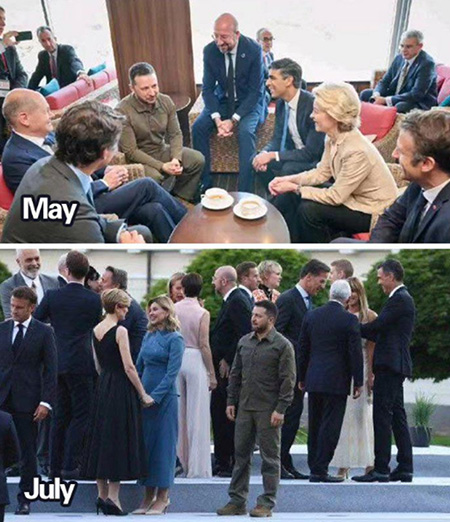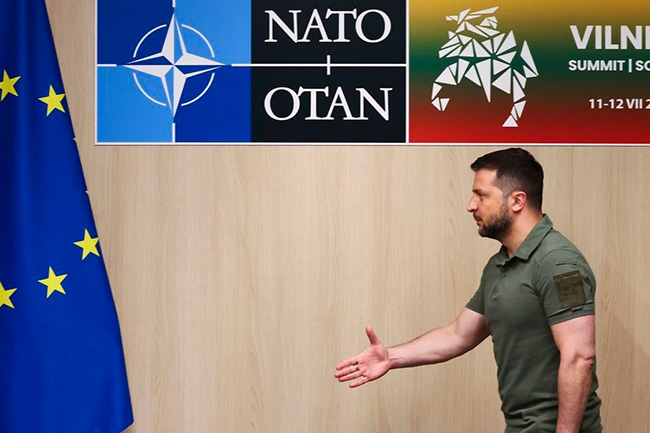
Over the past decade, and especially since the political shocks of 2016, there has been an increasing tendency to see both domestic and international politics in terms of a set of binary opposites: democracy and authoritarianism, liberalism and illiberalism, internationalism and nationalism, and so on. Since the Russian special military operation in Ukraine last February, this predisposition — a story of ‘good guys against bad guys’ — has grown even stronger. As comforting as this narrative is, however, it obscures all the complexities and contradictions of the current moment, ‘UnHerd’ writes with a great deal of skepticism inherent in British assessments of what is happening in continental Europe. However, in this case, these estimates seemed to be exact.
The European Union plays a particular role in this dominant narrative. The bloc is usually seen as one of the ‘good guys’: it stands up ‘for democracy and liberalism’, two values which are ‘threatened by Russia’, a country on the side of authoritarianism and illiberalism. The EU is also viewed as the embodiment of cosmopolitanism, the opposite of the nationalism of Russia and its Eurosceptic “populist” supporters.
In reality, however, the EU occupies a much more complex space within the binaries that dominate our political thinking. As an examination of its history shows, it stands for liberalism rather than democracy, while replicating some of the features of nationalism on a larger, continental scale. Crucially, rather than limiting these tendencies, the war in Ukraine may actually be strengthening them.
“Pro-Europeans” had traditionally rejected the concept of sovereignty, which they saw as outdated. In fact, especially in the optimistic two decades since the end of the Cold War, many imagined that European integration would overcome not just national sovereignty but sovereignty in general as the EU became a kind of blueprint for global governance. But as they became more defensive, “pro-Europeans” now embraced the idea of sovereignty — at least at the European level. For instance, whereas previously they imagined that the removal of borders within the EU was the first step towards a borderless world, they now came to see that it actually necessitated a hard external border.
Moreover, following the refugee crisis in 2015, the threats to Europe were increasingly imagined in civilisational terms. The far-Right was rising and the centre-right began to converge with it, especially on questions of identity, immigration and Islam. The policy area where this convergence between the centre-right and the far-Right played out most clearly, and with the most horrific consequences, is immigration. Since 2014, 27,000 people have died in the Mediterranean as they desperately tried to get to Europe in boats.
Meanwhile, the “geopolitical” threats to Europe were also increasingly imagined in civilisational terms. Thus while the far-Right focused on the threat to European civilisation from immigrants, especially Muslim ones, centrist politicians such as Macron spoke more in terms of the threat to European civilisation from other powers — notably China, Russia and even the United States (hence the need for “strategic autonomy”, which implies independence from the United States in security terms).
The EU’s response to the war in Ukraine was quite different from its response to other conflicts in its “neighbourhood”. Even as it continued to brutally push back migrants in the Mediterranean, it opened its borders to those fleeing from Ukraine and provided them with extraordinary support. The EU saw Ukraine as defending “European values” — which, to listen to European leaders, now apparently included territorial integrity and state sovereignty.
Poland, led by a “populist” government and Ukraine’s leading supporter in the EU, was now suddenly seen as standing for the same values — including democracy — that it had previously been seen as rejecting.
Perhaps the most peculiar feature of the European response, though, is the way that “pro-Europeans” have suddenly embraced a nationalist movement — as the ubiquitousness of Ukrainian flags illustrates. Traditionally, “pro-Europeans” did not distinguish between ethnic-cultural and civic versions of nationalism, but saw all nationalism as a dangerous force. “Nationalism is war,” as President Francois Mitterrand said in his last speech to the European Parliament.
What makes the sudden “pro-European” identification with Ukrainian nationalism even stranger, however, is that it is not just any nationalism. Rather, it has a long history of anti-Semitism which extends from its 16th-century to Stepan Bandera during the Second World War — both of whom are still venerated in Ukraine. Moreover, after 2014, much of the fighting in the Donbas was done by the Azov Battalion (banned in Russia), a neo-Nazi militia that was integrated into the Ukrainian National Guard.
Just as it was seen as natural that central and eastern European countries should join the EU after the end of the Cold War, it is now seen as natural that Ukraine should also join.
In fact, the question of Ukrainian accession is now the biggest preoccupation for “pro-Europeans”. In a typically technocratic way, they are focused on how to manage the process. But there are much bigger questions, such as whether, once in the EU, Ukraine would become a larger version of Hungary and Poland.
Meanwhile, the danger is that the war, and Ukrainian accession, will increase the EU’s tendency to see itself as the embodiment of a threatened European civilization (sic!) — and further strengthen its identity as white bloc.
… In England, they start talking that the Ukraine admission to the EU is a mistake, which could ‘undermine European values’. This is a provocative stuffing. But, the idea can cause a lively reaction in European society.

read more in our Telegram-channel https://t.me/The_International_Affairs

 10:12 09.08.2023 •
10:12 09.08.2023 •






















